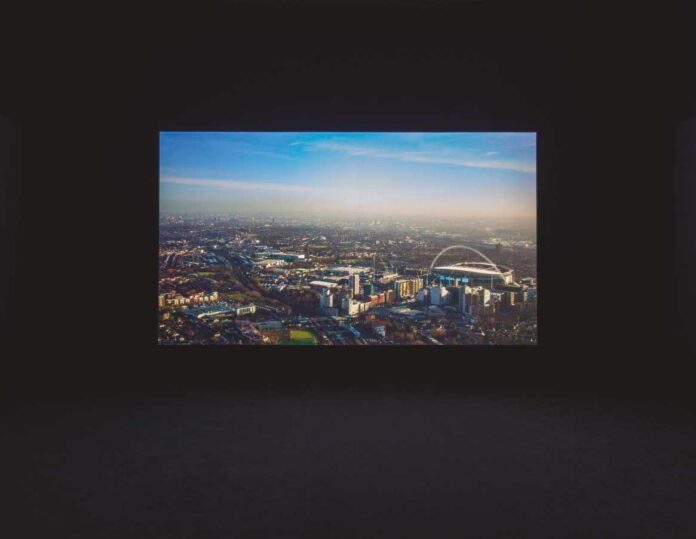“If MPs are turning their backs on something like this film, what does it mean?” In The Observer last month Steve McQueen expressed his dismay that only four British MPs had accepted an invitation to view his work Grenfell—about the fire in a London tower block that killed 72 people six years ago. Invitations were sent to dozens more and McQueen was appalled that most had not even replied. On the sixth anniversary of the disaster last week, even former prime minster Gordon Brown stepped in to urge every politician to see Steve McQueen’s film.
Grenfell was filmed in a single shot from a helicopter, beginning with green fields and suburban satellite towns and slowly moving towards London, eventually zoning in on the blackened 24-storey tower. It then circles it for around 20 minutes, its soundtrack silent, relentlessly forcing its audience to confront what Paul Gilroy, in a text about the project, calls the “charred obscenity” of the block.
I asked the Serpentine Galleries, where the work was shown, if McQueen going public about MPs’ apparent indifference had prompted action. It had—the Serpentine was “inundated” with politicians making arrangements to visit the gallery. This is obviously good, but it took McQueen’s anger to provoke them. Contrast this with the reaction of the media. It seems that most national UK newsrooms, and many beyond, reacted as The Art Newspaper’s did, seeing immediately that a hugely significant cultural event was about to happen and responding with suitable urgency: booking slots for the first screenings; swiftly reporting on or reviewing the show. So McQueen’s question remains vital: how can we fathom the MPs initial silence?
One interpretation: politicians were reluctant to confront the raw evidence of the injustice of Grenfell. In his short text about the project, the artist refers to the “deliberate neglect” that caused the fire. Gilroy, meanwhile, writes: “Grenfell ghosts haunt the political culture of a bitterly divided country where the known dangers that produced so much suffering are widespread, though they remain of only marginal interest to government and the complacent political class that serves it.”
To be clear, the MPs who failed to respond to McQueen’s invitation were from across the political spectrum (as were the four MPs who visited the Serpentine) and many have argued that the conditions Gilroy describes developed through the policies of successive Labour and Conservative administrations.
In The Observer, McQueen dismissed the idea that politicians might be wary of a piece of contemporary art. But I don’t share his optimistic view of MPs. My view is that the arts just don’t matter enough to most lawmakers. So that even a film by an Oscar- and Turner Prize-winning knight of the realm, about one of the most shocking recent events in British history, can’t stir them into engagement. Much evidence—swingeing cuts, the sidelining of arts and humanities education, the revolving door that is the culture ministry—supports that this is the present Conservative government’s attitude.
McQueen made Grenfell because he feared the tragedy might be forgotten. He was right to be concerned. Visionaries like him, who have contributed so much to Britain’s cultural landscape, deserve at least to be respected and listened to. That he had to resort to guilt-tripping MPs into visiting this major piece is depressingly instructive about the complacency towards and lack of regard for the arts in the House of Commons.

























